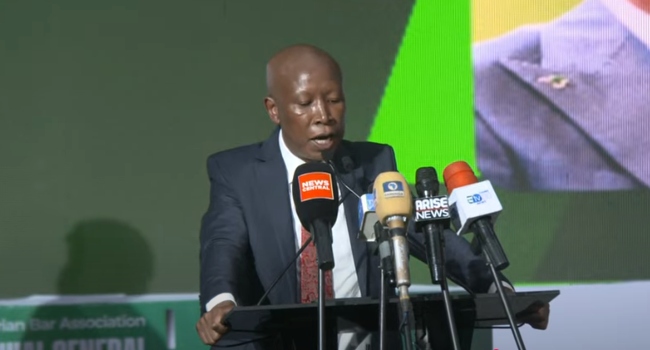South African opposition leader, Julius Malema, has praised Nigeria for its historic role in the fight against apartheid, while condemning xenophobia in his country as “a betrayal of African unity.”
Malema, who is the founder and leader of the Economic Freedom Fighters (EFF), spoke on Sunday at the opening of the 2025 Annual General Conference of the Nigerian Bar Association (NBA) held at the International Conference Centre, Enugu.
He described Nigeria as a nation that “holds a special place in the hearts of all South Africans,” recalling the country’s unwavering support for South Africa during its darkest years.
“When South Africa was shackled by apartheid and our people were murdered, imprisoned, and denied basic humanity, Nigeria rose as a giant for justice,” Malema said.
He highlighted Nigeria’s creation of the Southern African Relief Fund, the introduction of the “Mandela Tax” by Nigerian students, as well as the government’s boycott of the 1976 Olympic Games and the 1979 Commonwealth Games in protest against apartheid.
“These initiatives raised millions of dollars to support our liberation struggle, even as Nigeria faced its own challenges at home. Nigerian students also staged protests against apartheid and sacrificed portions of their income,” he said.
Malema noted that when Nelson Mandela was released from prison in 1990, one of his earliest visits outside South Africa was to Lagos and Abuja to personally thank Nigerians for their solidarity.
“These gestures are the foundation of a bond sealed in blood and sacrifice. However, this bond must not remain in the past—it must be carried forward into the present through concrete economic collaboration,” he said.
He called for stronger Nigeria–South Africa cooperation in mining, oil and gas, infrastructure, finance, agriculture, and technology, stressing that both countries “hold the keys to Africa’s industrialisation and economic independence.”
“Nigeria is blessed with oil, gas, and fertile lands, while South Africa holds some of the richest deposits of platinum, gold, manganese, and coal in the world. Combined, we have the resources and human capital to build a self-sufficient continent,” Malema said.
He lamented, however, that Africa’s vast resources continue to be exported cheaply to Europe, America, and Asia, only to be re-imported at high prices as finished goods.
According to him, Africa must build its own factories, process raw materials locally, and invest jointly in renewable energy and industrialisation.
Malema also acknowledged the economic and cultural exchanges between the two nations, noting the presence of South African companies like MTN, SPAR, and Multichoice in Nigeria, as well as the influence of Nigerian music, films, and literature in South Africa.
But he warned that xenophobia continues to threaten this relationship.
“South Africa’s hostility and discrimination against Nigerians and other Africans, manifesting in violence, killings, looting, and attacks on businesses, is unacceptable,” he said.
“Xenophobia is a betrayal of African unity and a sickness born of poverty.”


